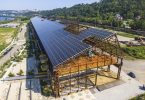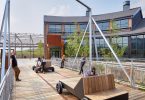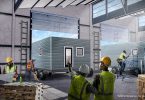A towering, vacant 1930s-era building located in Pittsburgh’s historic Hill District has become an urban center for learning, economic opportunity, and job training, while physically becoming a a beacon of sustainability and embodiment of future workforce opportunities.
With vision, collaboration, and investment from universities, foundations, and industry and civic leaders, The Energy Innovation Center emerged in the massive, abandoned Connelley Trade School to become an integratively designed LEED Platinum hub that today offers industry-informed education, workforce development, apprenticeship, and job training programs focused on construction, plumbing, roofing, utilities, project management, and more.
The Energy Innovation Center also offers collaborative work spaces dubbed “Pittsburgh Green Innovators” and houses a diversity of tenants, including energy sector corporations, national research laboratories, political and community leaders, economic development organizations, and academic institutions.

HVAC and plumbing inside the EIC are colorfully labeled and used as a teaching tool. Photo credit: Green Building Alliance
The rescue of this historically-designated building from degradation is an achievement in itself, but the care taken to responsibly repurpose this very visible property is a sign of Pittsburgh’s deep commitment to sustainable innovation and development. By providing accessible, neighborhood-based job training and education for city residents, The Energy Innovation Center embodies physical and economic investment in the Hill District community, a neighborhood adjacent to Downtown Pittsburgh that has suffered from past displacement, unemployment, and urban blight.
Building Design Highlights
- Designed to save over 50% in energy costs compared to a conventional building of comparable scale
- Color-coded, visible pipe and utility design that showcases building system for all visitors
- New site design reduces stormwater runoff by over 35% and treats 80% of total suspended solids on site
- Permeable parking lot directs storm water underground for capture, removal of suspended solids, and infiltration
- Ice storage produces and stores ice overnight to deliver free cooling when it is needed in the daytime
- An absorption chiller reuses heat released from other machines to power a cooling process
- Automatic zoned control system improves occupant comfort, and reduces energy consumption and cost through the efficient operation of building systems
- Highly efficient lighting power density due to LED lighting, occupancy sensors and photocell controls
- Native and adaptive plantings eliminate the need for artificial irrigation
- Water fixtures are designed to save over 40% of the water used in conventional buildings of similar size and use
- Low-emitting paints, sealants, adhesives, coatings, flooring and composite wood help ensure a healthy environment where harmful vapors are kept to a minimum
- 95% of construction and demolition debris diverted from landfill
History
When it opened in 1931, the Connelley Trade School building a library, science labs, cafeteria, gym, swimming pool and auditorium alongside traditional classrooms. The building site included a “shop” building equipped with industrial machinery and designed like a modern factory; a mill room and “power and equipment” shop. Students could learn bricklaying and plastering, plumbing, auto mechanics, electrical wiring, carpentry and cabinetry, graphic arts and more. The school was not able to survive the collapse of the rustbelt economy or Pittsburgh’s declining population; in 2004, the building closed.
Over the years, many advocated for reinvestment in vocational education (including parents, educators, and local leaders). Under the leadership of Pittsburgh Gateways Corporation and with the help of nonprofits, unions, foundations, regional universities, and industry partners, an initial investment of more than $40 million transformed the building through an integrated design-build process. Learn more at http://www.eicpittsburgh.org/.
Contact:
Energy Innovation Center
412-894-9800 / info@eicpittsburgh.org







